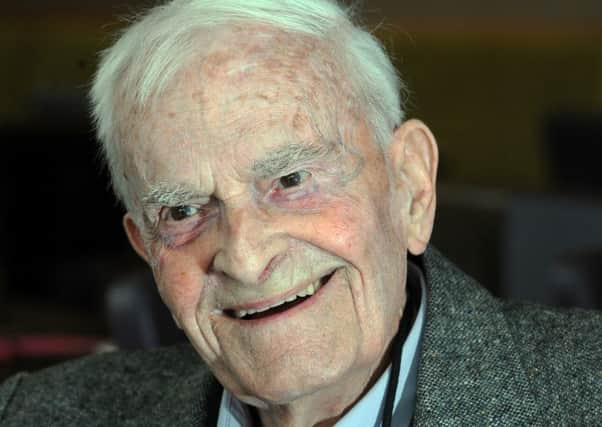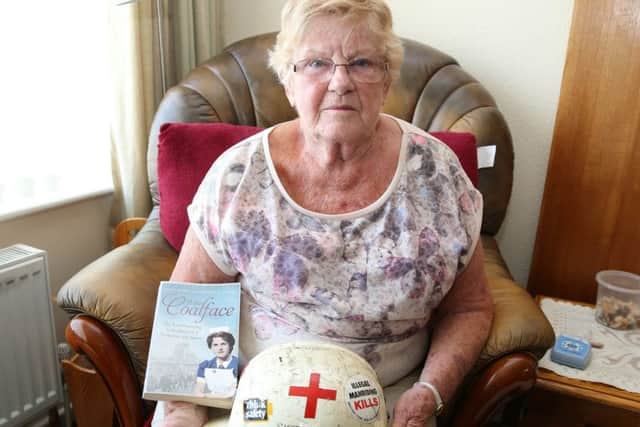Why we don't have to be afraid of growing old


THERE are few certainties in life but death is one of them.
There’s not a person born who isn’t going to shuffle off this mortal coil at some point. It’s nature’s way of saying “time’s up” and, barring some grotesque dystopian future, that’s the way it will always be.
Yet as more of us live longer, healthier lives, the question of mortality and growing old is something we increasingly shy away from, as if by not talking about it then somehow it won’t happen.


Advertisement
Hide AdAdvertisement
Hide AdHowever, it could be said that older people in this country have never had it so good, to misappropriate Harold MacMillan’s famous phrase. A report from Public Health England published earlier this year found that older people are living longer than ever before, claiming that men aged 65 can expect to live for another 19 years and women a further 21 years.
When it comes to elderly people’s well-being, health and wealth are the two key drivers. But there is often a big difference between those aged 65 to 70 and those who are over 80, with the latter more prone to suffering poor health, living alone and feelings of loneliness.
Some elderly people also have to continue working, often as carers. Age UK reported this week that the number of people in their 80s or older who are relied on as carers has rocketed in the last seven years, with one in seven of the “oldest old” – an estimated 417,000 people in total – now providing some sort of unpaid care to family or friends.
Lurking behind many people’s concerns about growing old is the fear of developing dementia, with the number of people living with the condition in the UK predicted to reach one million within a decade.


Advertisement
Hide AdAdvertisement
Hide AdBut despite such worries, old age can offer a host of new opportunities and for many people it is a chance to travel, write, or learn a new language.
This was born out by a study for the Office for National Statistics published in February which found that 65 to 79-year-olds were the happiest adult group.
This chimes with previous research suggesting that older retired people are increasingly embracing new experiences and continuing the kind of lifestyles they enjoyed before they stopped working.
More elderly people are trying to live independent and active lives for as long as possible and a growing number of them are using their twilight years to fulfil unlikely dreams and ambitions – like the 93-year-old man who last year completed a zip wire challenge to raise money for his local church.
Advertisement
Hide AdAdvertisement
Hide AdEighty-four year-old Joan Hart, from Doncaster, is among those who refuse to be shackled by their age.
As well joining a writing class, she raised money for charity doing a wing-walk when she was in her 70s and last year published her memoir about her years as a nurse working in the Yorkshire pits.
She believes the elderly generation has more to offer than many people perhaps appreciate. “I think the people in charge need to realise that old people are doing much more than they used to.”
However, she says that some elderly people could do more to help themselves. “I have friends who I see and I very rarely get lonely. But I know a lot of people who are lonely and the thing is they’re partly to blame for not putting themselves out there. It’s an individual thing, but you’ve got to ask yourself what you want out of life and then go and get it,” she says.
Advertisement
Hide AdAdvertisement
Hide Ad“It was my birthday this week and I had a fabulous time. I went to a garden centre to get some plants for my garden and I had lunch with some friends. Then I was taken out by people from my writers group yesterday and someone’s taking me out for a meal tonight.”
Not that she shies away from the sober practicalities of growing old. “I’ve already paid for my funeral and I’ve written my funeral service because I don’t think it’s fair to leave these things behind for relatives to pick up.”
Death shouldn’t be a taboo subject but she says many people are afraid of talking about it. “Some old people can’t talk about things like that. My brother can’t talk about dying, he just clams up. But we’re all going to die and I think we need to talk about it.
“A lot of people are frightened about what will happen if they can’t cope any more. I’ve said to my GP that I don’t want to be dependent and if my health gets worse I don’t want to go into a home, but I know I might have to.”
Advertisement
Hide AdAdvertisement
Hide AdJoan says she can’t move as well as she could a couple of years ago but still makes sure she gets out and about.
“I refuse to have a scooter, I’m defiant about that, so I use a walker instead. It takes me a bit longer but I don’t stay in much during the day and the telly doesn’t come on before seven at night.”
She also makes an effort to get out into her garden. “I still potter around in my garden even though my movement’s not great, but I make myself do it. You’ve got to be positive. We all get older, no one can stop that, it’s just a question of working out what you can do.”
Harry Smith is another inspiring figure. The Second World War veteran, originally from Barnsley divides his time between Canada and the UK. Now 93, he has written a number of books and memorably moved many to tears at the Labour Party Conference in 2014 when he took to the podium to speak about his poverty-stricken past.
Advertisement
Hide AdAdvertisement
Hide AdHarry is back in Yorkshire and appearing at the Bradford Literature Festival on Sunday when he will be part of a panel discussing mortality and ageing.
“I feel my age now but the speaking tours I do are a great tonic and they make me feel that I have something positive to give my community,” he says.
“People need to come to terms with mortality because no one escapes it. I’ve been lucky because I think that my time spent on this earth has been wonderful. There’s been far too much sadness but there has been so much joy and laughter as well.”
He says that retirement should be seen by people as a chance to explore new things rather than a reason to sit back and do nothing.
Advertisement
Hide AdAdvertisement
Hide Ad“The mistake people make when they retire is they think ‘that’s it’ and they sit back and take it easy, which is the worst thing to do. The human body is not made for lounging around and when you’re old the body needs exercise and movement and so does the brain.”
Harry believes that no matter how old someone is it’s never too late to adapt. He taught himself how to use computers during his 80s and has embraced social networking sites like Twitter and Facebook.
“You need to use technology if you want to survive because it’s here to stay, so why not learn how to use it? It’s helped me encounter so many different views from people all over the world who I would never have come across if I didn’t use a computer and it has broadened my knowledge.”